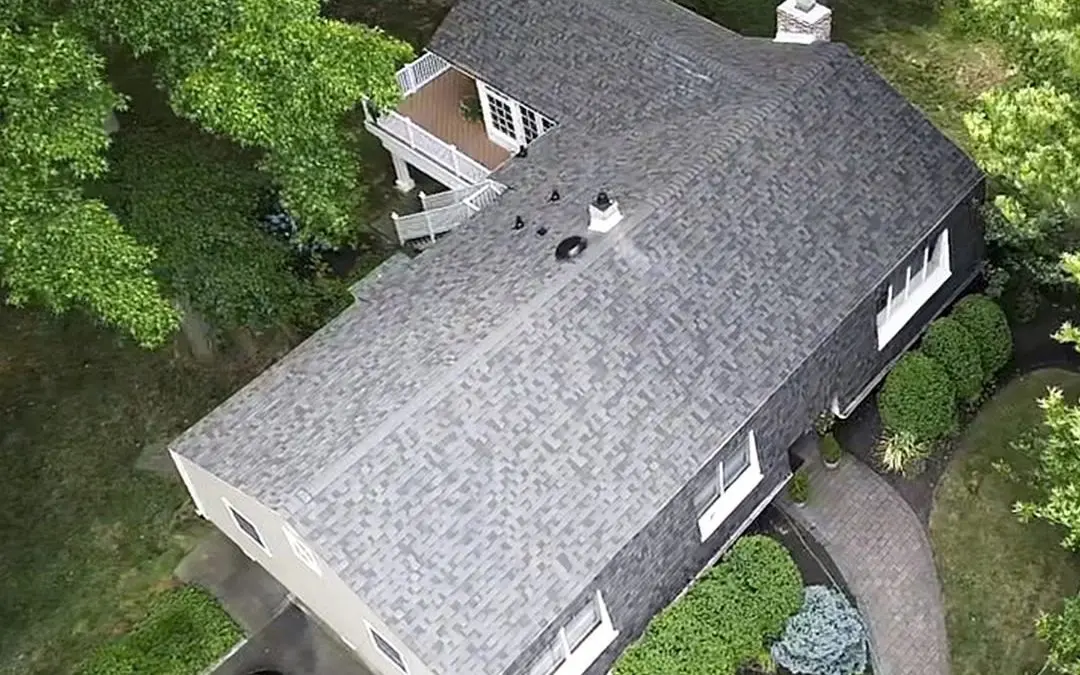If you’re a homeowner in New Jersey, you’ve probably wondered at some point – how long do roofing shingles last? Your roof is a major investment in your home, and knowing how well it can withstand New Jersey’s changing weather conditions can help you avoid unnecessary stress and costly repairs over time.
The answer isn’t always simple. Several factors determine how long your shingles last – from the materials you choose to how well your roof is maintained. But in a climate like New Jersey’s, where we experience hot summers, cold winters, and everything in between, roofing shingles can wear out faster than you’d expect.
Let’s break down everything you need to know about how long roofing shingles last in New Jersey – plus, how to make them last longer.
Understanding Roofing Shingles and Their Lifespan
Before getting into the details, it’s important to understand the fundamentals first.
Roofing shingles are the outermost layer of your roof and serve as the main line of defense against rain, snow, wind, and sunlight. The durability of roofing shingles is determined by several crucial factors, such as:
- The type of shingles used (asphalt, architectural, wood, or metal)
- Quality of installation
- Local weather conditions
- Maintenance frequency
- Ventilation and insulation
When properly installed and maintained, most shingle roofs can last between 15 to 30 years. But in New Jersey, the actual lifespan can vary due to the unique regional climate.
The Impact of New Jersey’s Climate on Roof Shingles
New Jersey experiences all four seasons – from scorching summer heat to icy winter storms. This constant cycle of expansion and contraction can shorten the lifespan of your shingles.
Here’s how the local climate affects your roof:
1. Hot, Humid Summers
- High temperatures and humidity can cause shingles to expand and curl.
- UV exposure breaks down the asphalt layers, leading to fading and cracking.
- Poor attic ventilation traps heat, further accelerating wear and tear.
2. Cold, Snowy Winters
- Cold weather causes shingles to become stiff and fragile, increasing the risk of cracks and breakage.
- Ice dams can form along the edges, forcing water under the shingles.
- Snow accumulation adds extra weight, especially on older roofs.
3. Spring Rains and Thunderstorms
- Heavy rain can erode granules on shingles, reducing their protective layer.
- Strong winds during storms may lift or loosen shingles.
4. Coastal Influence
- Homes closer to the shore experience salt-laden air, which can speed up corrosion and material breakdown.
- Moisture from sea air can also contribute to mold and algae growth.
All these weather factors combined make maintaining your roof in New Jersey essential if you want to get the most out of it.
Average Lifespan of Different Types of Roofing Shingles
Not all shingles are created equal. The material and quality determine how long they last in New Jersey’s climate.
1. Asphalt 3-Tab Shingles
- Average lifespan: 15-20 years
- These are the most affordable option but also the least durable.
- They can degrade faster under extreme temperatures and heavy snow.
2. Architectural (Dimensional) Shingles
- Average lifespan: 25-30 years
- Thicker and more durable than standard asphalt shingles.
- Designed to withstand higher wind speeds and better resist temperature swings.
3. Premium Asphalt Shingles
- Average lifespan: 30-40 years
- Made from superior materials with advanced UV protection.
- Excellent choice for New Jersey homeowners who want longevity.
4. Wood Shingles or Shakes
- Average lifespan: 20-30 years
- Offer a natural look but require regular maintenance.
- Not ideal for humid or coastal areas due to the risk of mold and rot.
5. Metal Roofing Shingles
- Average lifespan: 40-70 years
- Extremely durable and weather-resistant.
- More expensive upfront but worth it for long-term protection.
If you live in New Jersey and plan to stay in your home for decades, investing in architectural or premium shingles is a smart move.
Factors That Affect How Long Roofing Shingles Last
Even the best shingles can wear out prematurely if certain factors aren’t addressed. Here’s what impacts their longevity:
1. Roof Ventilation
Poor ventilation traps heat and moisture in the attic, which can cause shingles to blister or curl.
2. Installation Quality
A properly installed roof by a certified contractor can last years longer than one that was rushed or done incorrectly.
3. Maintenance Routine
Regular inspections help identify small issues like missing granules, cracks, or lifted shingles before they become serious problems.
4. Sun Exposure
Roofs that face direct sunlight all day will age faster than those shaded by trees or other structures.
5. Storm Damage
High winds, hail, and debris can cause immediate damage that reduces the lifespan if not repaired quickly.
How to Make Your Roofing Shingles Last Longer
While you can’t control New Jersey’s weather, you can take steps to protect your roof and extend its life.
Here’s how:
- Schedule annual roof inspections – Have a professional check for cracks, loose shingles, and soft spots.
- Clean gutters regularly – Clogged gutters trap water, leading to rot and leaks.
- Trim overhanging branches – Prevent damage from falling debris and reduce shade-related moisture buildup.
- Ensure proper attic ventilation – Keeps temperature and humidity balanced.
- Repair damage immediately – Small problems grow fast if ignored.
- Use algae-resistant shingles – Helpful in humid or coastal New Jersey areas.
- Apply protective coatings – Some sealants can help reflect UV rays and add years to your roof’s life.
Consistent maintenance can easily add 5-10 years to your roof’s lifespan.
Warning Signs Your Shingles Are Near the End
Even with great care, every roof eventually reaches the end of its life. Watch out for these red flags:
- Curling or buckling shingles
- Missing granules or bare spots
- Dark streaks or algae growth
- Leaks or water stains inside your home
- Sagging areas on the roof
- Cracked or broken shingles
- Shingles falling off after storms
If you notice multiple signs, it may be time to consider a roof replacement instead of another repair.
How Often Should You Replace Roofing Shingles in New Jersey?
In general:
- Standard asphalt shingles: every 15-20 years
- Architectural shingles: every 25-30 years
- Premium or metal shingles: 35+ years
However, you might need replacement sooner if your roof has suffered severe storm damage or wasn’t properly maintained.
Homeowners often underestimate how much climate plays a role. A roof that lasts 25 years in a mild state may only last 18-20 years in New Jersey due to temperature extremes and winter weather.
Why Professional Installation Matters
You might be tempted to cut costs with a low-budget roofing job, but professional installation pays off long-term.
A certified roofing contractor ensures:
- Correct nailing and sealing techniques
- Proper underlayment and flashing
- Adequate ventilation
- Full warranty protection
Poor installation can reduce your roof’s lifespan by several years, even if you use top-quality materials. Always work with a trusted, local roofing company familiar with New Jersey’s conditions.
FAQs
1. How long do roofing shingles last on average?
Most asphalt shingles last between 15 and 30 years, depending on the type and local climate.
2. What’s the best shingle type for New Jersey weather?
Architectural shingles are the most popular choice for New Jersey homes. They balance durability, cost, and resistance to wind and temperature changes.
3. Can roof maintenance extend the life of shingles?
Yes. Routine maintenance like cleaning gutters, fixing loose shingles, and inspecting the attic can add up to 10 extra years to your roof’s lifespan.
4. How do I know if my shingles need replacing?
Look for curling, missing shingles, leaks, or noticeable granule loss. These are clear signs your roof is reaching the end of its life.
5. Should I repair or replace my old roof?
If your roof is more than 20 years old and repairs are becoming frequent, replacement is usually more cost-effective.
Final Thoughts
So, how long do roofing shingles last in New Jersey’s climate?
It depends on the material, installation quality, and how well you maintain your roof. On average, you can expect anywhere from 15 to 30 years of protection – but with regular inspections and care, you can push that even further.
If you think your roof may be nearing the end of its lifespan, don’t wait until leaks or damage appear.
Contact Home Makeover LLC – New Jersey’s trusted roofing experts – for professional roof inspections, maintenance, and full roof replacement services to keep your home safe year-round.

About the Author: Jeffrey W. Nero
Jeffrey W. Nero is a home improvement expert with over 20 years of experience serving homeowners in New Jersey. As the owner of Home Makeover™, Jeff combines quality craftsmanship with a deep understanding of local needs. From roofing and siding to deck remodels, Jeff has helped thousands of homeowners bring their visions to life. His commitment to excellence and customer satisfaction makes him a trusted partner in transforming homes across Central NJ.

